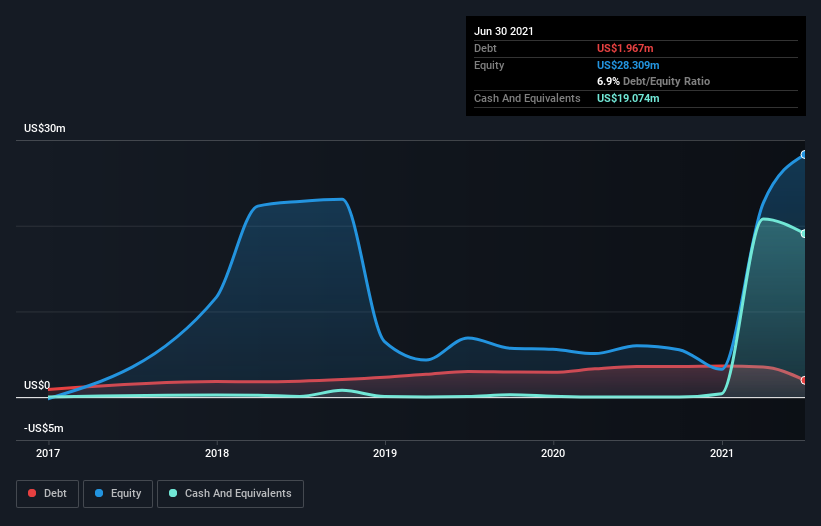Health Check: How Prudently Does CryptoStar (CVE:CSTR) Use Debt?
The external fund manager backed by Berkshire Hathaway's Charlie Munger, Li Lu, makes no bones about it when he says 'The biggest investment risk is not the volatility of prices, but whether you will suffer a permanent loss of capital.' When we think about how risky a company is, we always like to look at its use of debt, since debt overload can lead to ruin. As with many other companies CryptoStar Corp. (CVE:CSTR) makes use of debt. But should shareholders be worried about its use of debt?
When Is Debt A Problem?
Debt assists a business until the business has trouble paying it off, either with new capital or with free cash flow. In the worst case scenario, a company can go bankrupt if it cannot pay its creditors. However, a more common (but still painful) scenario is that it has to raise new equity capital at a low price, thus permanently diluting shareholders. Of course, plenty of companies use debt to fund growth, without any negative consequences. The first step when considering a company's debt levels is to consider its cash and debt together.
Check out our latest analysis for CryptoStar
What Is CryptoStar's Debt?
As you can see below, CryptoStar had US$1.97m of debt at June 2021, down from US$3.57m a year prior. But on the other hand it also has US$19.1m in cash, leading to a US$17.1m net cash position.
A Look At CryptoStar's Liabilities
According to the last reported balance sheet, CryptoStar had liabilities of US$619.0k due within 12 months, and liabilities of US$4.05m due beyond 12 months. Offsetting these obligations, it had cash of US$19.1m as well as receivables valued at US$221.6k due within 12 months. So it can boast US$14.6m more liquid assets than total liabilities.
This surplus suggests that CryptoStar is using debt in a way that is appears to be both safe and conservative. Given it has easily adequate short term liquidity, we don't think it will have any issues with its lenders. Succinctly put, CryptoStar boasts net cash, so it's fair to say it does not have a heavy debt load! The balance sheet is clearly the area to focus on when you are analysing debt. But ultimately the future profitability of the business will decide if CryptoStar can strengthen its balance sheet over time. So if you want to see what the professionals think, you might find this free report on analyst profit forecasts to be interesting.
Over 12 months, CryptoStar made a loss at the EBIT level, and saw its revenue drop to US$769k, which is a fall of 85%. To be frank that doesn't bode well.
So How Risky Is CryptoStar?
Statistically speaking companies that lose money are riskier than those that make money. And in the last year CryptoStar had an earnings before interest and tax (EBIT) loss, truth be told. And over the same period it saw negative free cash outflow of US$8.6m and booked a US$7.5m accounting loss. Given it only has net cash of US$17.1m, the company may need to raise more capital if it doesn't reach break-even soon. Even though its balance sheet seems sufficiently liquid, debt always makes us a little nervous if a company doesn't produce free cash flow regularly. There's no doubt that we learn most about debt from the balance sheet. However, not all investment risk resides within the balance sheet - far from it. For example, we've discovered 5 warning signs for CryptoStar (3 are a bit unpleasant!) that you should be aware of before investing here.
If you're interested in investing in businesses that can grow profits without the burden of debt, then check out this free list of growing businesses that have net cash on the balance sheet.
This article by Simply Wall St is general in nature. We provide commentary based on historical data and analyst forecasts only using an unbiased methodology and our articles are not intended to be financial advice. It does not constitute a recommendation to buy or sell any stock, and does not take account of your objectives, or your financial situation. We aim to bring you long-term focused analysis driven by fundamental data. Note that our analysis may not factor in the latest price-sensitive company announcements or qualitative material. Simply Wall St has no position in any stocks mentioned.
Have feedback on this article? Concerned about the content? Get in touch with us directly. Alternatively, email editorial-team (at) simplywallst.com.

 Yahoo Finance
Yahoo Finance 
